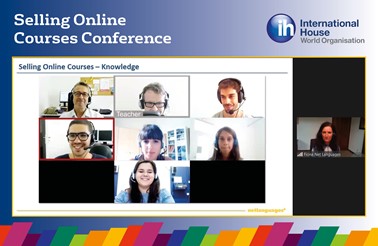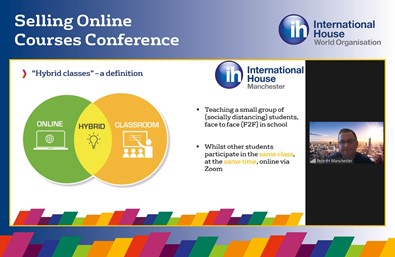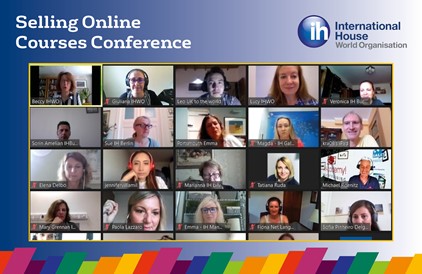What do customers really want when it comes to taking an online course? This very important question is something language schools around the globe are trying to answer right now. At International House, we always like to ask ourselves questions and investigate topics which are of interest to our members. For this reason, this year we organised our very first Selling Online Courses Conference, which took place virtually on September 16th and 17th.
We wanted to help our IH schools by inviting speakers from around the network – and beyond – to share what’s new regarding selling online courses. Although many of our schools originally moved to teaching online earlier this year as an emergency measure, they are now offering regular online courses as part of their portfolio, so this has become a new and important market for International House.
In the same manner of a sales funnel, the Selling Online Courses Conference was divided into four main topics of sessions: Knowing your Customers, Generating Leads, Nurturing Leads, and Closing the Sale.
A fundamental part of a successful sales process is for schools to put themselves in their customers’ shoes and draw a customer journey map based on 3 stages:
- Stage 1 Awareness of course
- Stage 2 Finding out more
- Stage 3 Deciding yes or no?
For each one, schools should try to understand what their customers are doing or thinking at that stage and what their thinking criteria is. When it comes to selling online, first impressions are very important – even more so than selling face-to-face – as the customer is not buying a physical product, but rather a service, hence something of value which is immaterial. So solving all of your customers’ doubts and questions will generate great leads for your business.
 To start the conference, Beccy Wigglesworth from IHWO assembled a panel consisting of real language learners. We listened to what attracted them to the course and school, and what specifically clinched the sale. The customers spoke about their experience to help us understand what is important to them. What are the key elements which convinced our customers to book and spend money on an online course with IH? What are the key messages about the online experience that we need to communicate in our sales messaging?
To start the conference, Beccy Wigglesworth from IHWO assembled a panel consisting of real language learners. We listened to what attracted them to the course and school, and what specifically clinched the sale. The customers spoke about their experience to help us understand what is important to them. What are the key elements which convinced our customers to book and spend money on an online course with IH? What are the key messages about the online experience that we need to communicate in our sales messaging?
With online, the extra challenge is that a competitor could be a global provider, an online school, or a language school around the corner – though the lack of geographical limitation is also a huge opportunity. What do you need to know as a school to stand out from competition? To differentiate your online language learning products, not only do you need to know what your customer wants but also what your competitors are offering and how they are presenting their offer. We looked at examples of some of the large providers selling online courses to see how they are differentiating and selling. We also looked at outlining how you can analyse your local or known competitor’s offer and use this to refine your product and ensure what you offer is better than the competition. Generic general language courses are very difficult to sell. School must differentiate their product. either actually or in the marketing description.
When it comes to marketing your online courses, having multiple sources of traffic to your website should be a fundamental part of your strategy, according to Herbert Gerzer from Language School Digital Marketing. Schools should not rely on simply one method whether it is word of mouth, agents, campaigns, Facebook and Instagram ads – they need to have several channels so that they keep their pipeline full and drive more traffic to online courses.
From being cold traffic to hopefully turning into a customer, the journey can be steep but there are some steps which are important to make. For example, storytelling or a narrative can be more effective than traditional copy because you are speaking to potential students from their perspective. You want to make it about them and not so much about the features of your courses. Talking about peoples’ fears and desires in a positive way can be powerful as they will understand the benefits they will get from choosing your services. Video testimonials are also interesting as they are about real students, so no stock images or videos, and you can use these in your ads to relate more closely to your prospective students. In other words: track, measure, see where people fall out of the sales funnel, chase up, train your staff, change what you do. Sell. But before you can do any of these paid ads and campaigns and sell, you need to build up your social credibility and make sure that your website and social media channels are all geared towards delivering the right message to the right audience and, of course, selling a very good product!
During the conference, there were incredible contributions and several invaluable tips and suggestions offered by IH schools. These included the 5 ways to convert leads  into sales by Daniel Saron from IH Madrid, the innovative solution of offering Hybrid classes presented by Peter Hayes from IH Manchester, running B2B sales meetings with Fiona Thomas from NetLanguages, how to turn creativity into sales with new product development from Ariel Lopez and Orlando Delgada Mata from IH Mexico, how to use AI to improve placement testing from IH San Sebastian, and level testing and sign-up sheets from Justine Hince from IH Arezzo.
into sales by Daniel Saron from IH Madrid, the innovative solution of offering Hybrid classes presented by Peter Hayes from IH Manchester, running B2B sales meetings with Fiona Thomas from NetLanguages, how to turn creativity into sales with new product development from Ariel Lopez and Orlando Delgada Mata from IH Mexico, how to use AI to improve placement testing from IH San Sebastian, and level testing and sign-up sheets from Justine Hince from IH Arezzo.
We also looked at the journey of a potential customer from reading an online ad to signing a contract using Google Ads and e-mail marketing campaigns with the help of Ludolf Schnittger and the team at IH Hamburg.
Thanks to Martijn van de Veen, VP Business Development at ICEF, we also worked with a small group of agents who are active in selling online courses. It reconfirmed that online courses are here to stay and schools and agents who are working to offer a better service to their customers will be ahead of the curve.
Sessions presented by experts from around the IH network and beyond helped us reflect more on knowing our customers, generating and nurturing leads, and closing the sale.
The one big takeaway is that we may be online behind a computer screen, but the human touch is even more important. That is what International House schools are good at, it's what we are known for, and it will still be front and centre of our approach.
The event was very well received, and feedback was positive from members! A huge thank you to all presenters and participants:
Beccy Wigglesworth, IHWO
Keith Armstrong, student
Jennifer Villamil, student at IH Bristol
Leonardo Andres Ancebu, from the agency UK to the World
Lucy Horsefield and Giuliana Faldetta, IHWO
Ludolf Schnittger, IH Hamburg
Herbert Gerzer, Language School Digital Marketing
Daniel Saron, IH Madrid
Peter Hayes, IH Manchester
Fiona Thomas, Net Languages
Martijn van de Veen, VP Business Development, ICEF
Ariel Lopez & Orlando Delgada Mata, IH Mexico
Iñaki Letamendia & Emma Heyderman, IH San Sebastian
Tanya Harn, IH OTTI
Justine Hince, IH Arezzo